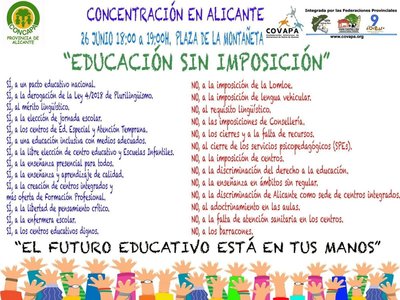How the parties understand elections and multilingualism
More language imposition in Valencia!
June 23, 2021
The holidays have begun and it is time in schools and administrations to extend the language imposition. This is what the ESO (secondary = pupils from 11-16) in the Comunidad Valenciania is now facing in a trunch of laws, regulations and countering court decisions. They call it multilingualism and the whole thing builds on the fact that Valenciano language imposition was already extended for those starting school in 2018.
The Valencian government pretends that this is democratically legitimate. Do the people have choice?
Readers of this blog will be well aware that Spanish is the mother tongue of the majority of the inhabitants in all autonomous regions of Spain. However, the distribution is quite different in the individual parts of these regions. In Alicante, the southern province of the Valencian community, the proportion of Valenciano speakers sometimes drops below 10%. In Valencia's capital, the proportion is probably also very low. In the interior, such as in Alcoy, it is possibly be the other way round.
Vicent Marzà, the Valencian Minister of Education, announced on Monday in A Punt (regional TV channel) that 60% of secondary school students „will be taught mainly in Valenciano“, compared to the current 28%. El Mundo notes that „the current law replaces a first decree of the Generalitat that the Diputación de Alicante managed to overturn in court for discrimination against Spanish. Under the current regulations, both Spanish and Valenciano must be taught at least 25% of the time, while English is reserved for a range between 15% and 25% of the time, depending on the resources and needs of each centre.“
25 plus 25 plus 15 to 25 is a maximum of 75, what happens to the remaining 25-35%? They should be filled with Valenciano, if possible up to 60%, and „encouraged“ by the administration. (I believe, pupils should be encouraged, not languages!) In this way, the 25% Spanish can then be relegated to the subjects of sport, music and mathematics, where limited language is required this is often done. Decisions on this, again, are to be made by the schools with the approval of the local school council. Sounds democratic, doesn't it?
Let's look at this from the perspective of the constitution. The Comunidad Valenciana is bilingual, Spanish and Valenciano. The Spanish constitution stipulates that every Spaniard should know Spanish, which is understandable, because otherwise the citizen cannot reasonably participate in Spanish political life. But in bilingual Valencia, one language can be good for political participation, Spanish or Valenciano.
The pupil's point of view? He/she have usually grown up in the parental home with a mother tongue. The best way to learn is using the mother tongue. So the schools should offer him exactly these opportunities. Those who grew up with Valenciano should have the opportunity to learn in Valenciano, those who grew up with Spanish should be able to learn in Spanish.
For all those who are educated in Valenciano, Spanish would be the first foreign language to be taught to a reasonable extent. Those who are educated in Spanish should have the opportunity to learn Valenciano, but should not be forced to do so. This compulsion could lead to considerable disadvantages in individual cases, e.g. for children of parents who change their place of residence within Spain due to their profession, as is the case with soldiers, for example.
However, there is no choice among these models for the parents. Instead, there is always a compulsory share for the respective minority language. The law always makes rules for the parents to choose from, and they are still dependent on the local administration for this choice. So it often happens that a majority of say 55% decides what the others have to learn. The needs of these children and parents play no part in the decision making. It is also the case that decisions are taken against the majority by means of the local administration.
Now, one might think that this understanding of elections and multilingualism is typical of the left parties. Far from it. In Galicia, the PP is in government and in principle it acts no differently than the PSOE in Valencia. The parties are always right and they believe that they know better what is good for the parents and the children. Just like the song of the old East German communist party: „The party is always right!“ It's time we told the politicians that parents should decide on the language of instruction in their childrens school, not them!
In Valencia this would be Spanish or Valenciano, in Galicia Spanish or Galician, in Catalonia Spanish or Catalan or Arranese, etc.
Under these circumstances, one has to ask what the whole thing is about. Why this language dispute? My answer is that the parties want to distract from the real problems, but we don't know. It is so absurd. What would be your answer?
Whatever your answer, in the coming elections it is time to present to all parties the demand for free choice of language and to force local administrations to express themselves bilingually and not unilaterally in a minority language. Whatever your opinion on the Corona policy, it is a monstrous contempt of the people to send out regulations and vaccination dates only in one language in Valenciano, Basque, Catalan etc., but not in Spanish. Multilingualism is something else!
Call for the demo in Alicante
On 26 June 2021, the COVAPA (Confederación Valenciana de APAs_AMPAs = Parents' Associations of Valencia) are calling for a demonstration in Alicante in the Plaza de la Montañeta.
The Motto:
Education without language imposition. The future is in your hands!
| | | | Click here to subscribe or cancel your subscription |
Myths and deceptions of Catalan nationalism

Here you'll find the translation
The strategy of recatalanization
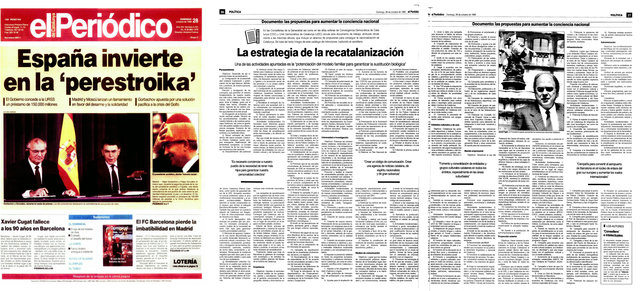 1980 the Spanish journal "El Periodico" published a secret document about the strategy of the Catalan government. It shows in a frightening way the actual spiritual world of the separatist leaders.
1980 the Spanish journal "El Periodico" published a secret document about the strategy of the Catalan government. It shows in a frightening way the actual spiritual world of the separatist leaders.Now it is available in english translation.
Pancatalanism
the separatist's imperial claim
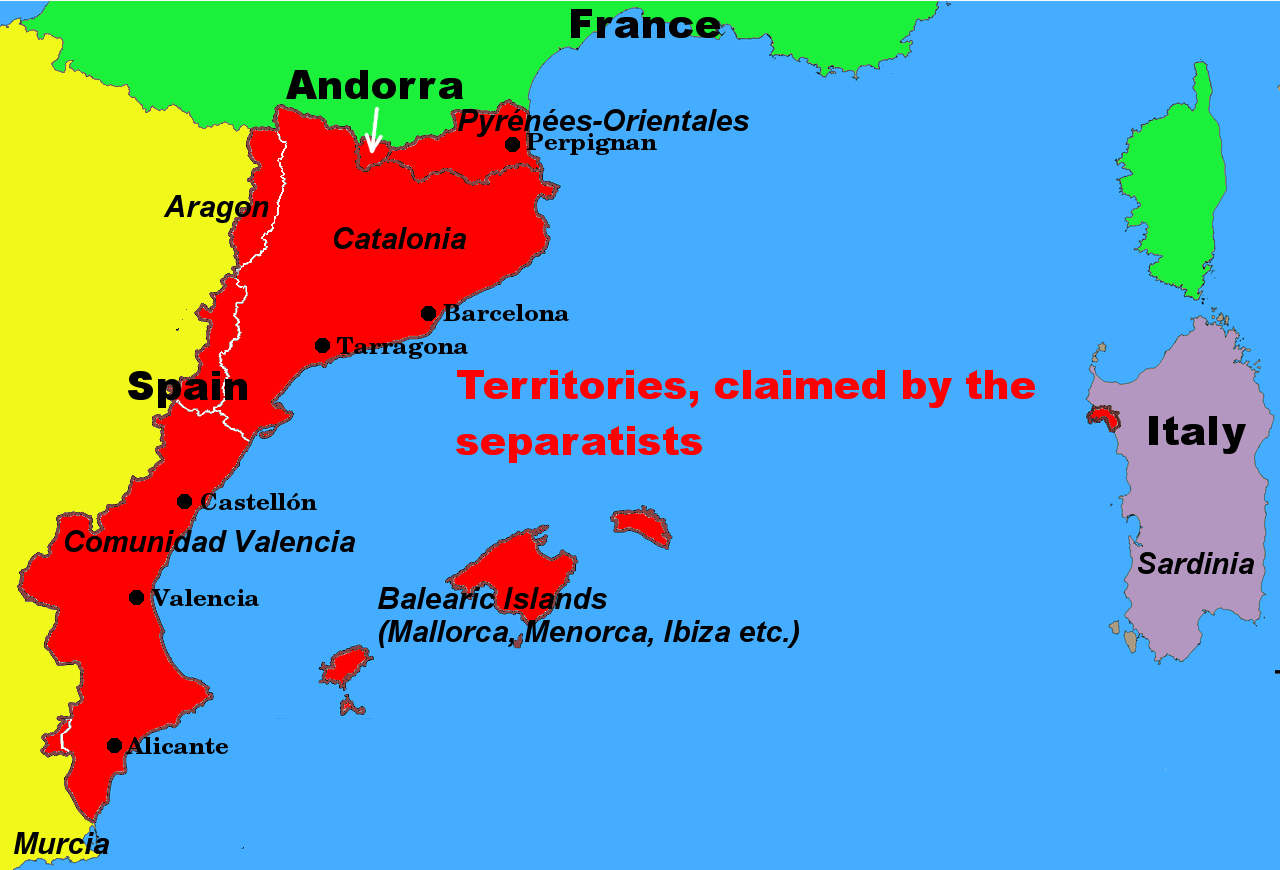 The Catalan government exports the conflict into communities with Catalan population, supporting all efforts of the separatists including financial means to destroy Spain.
The Catalan government exports the conflict into communities with Catalan population, supporting all efforts of the separatists including financial means to destroy Spain. An important tool is the establishment of a language dictatorship that is not afraid to use the same means as Franco.
Separatist indoctrination

Click here to read the study
Language imposition and democracy
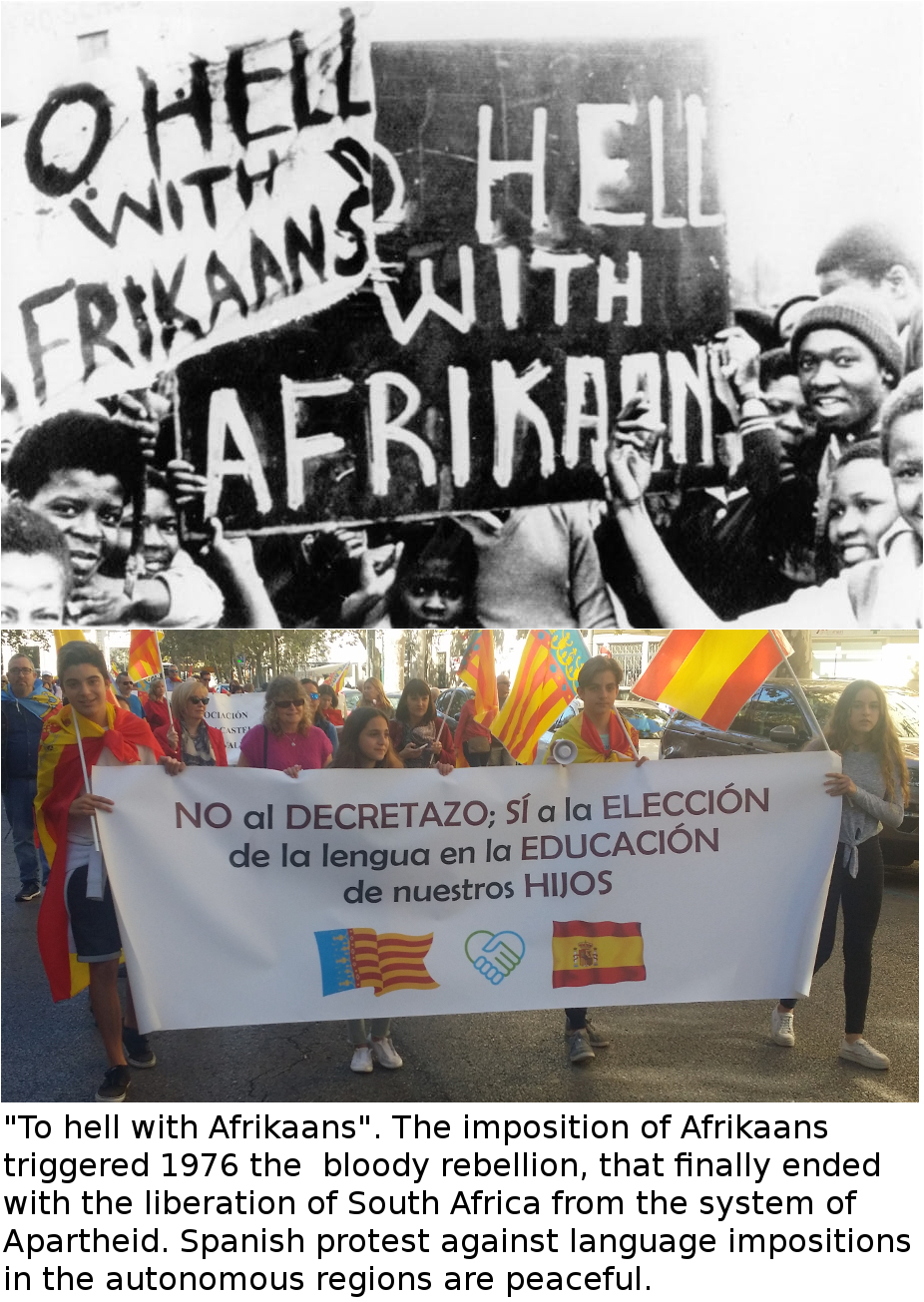
An essay in 6 parts on the potentially violent effect of language imposition containing contributions from South Africa, Catalonia, Ukraine and France.
go to part 1
Publications
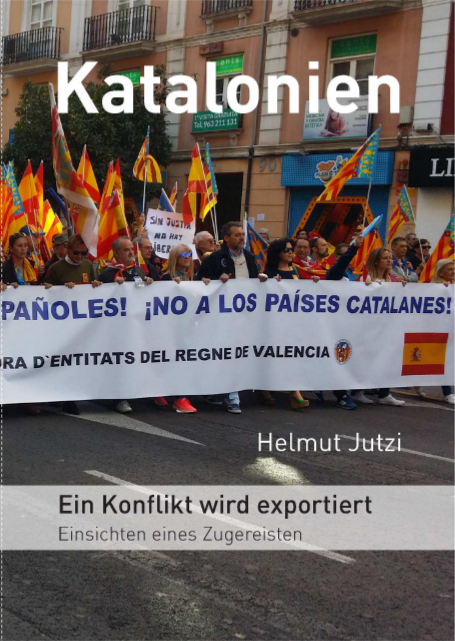 The title says: "Catalonia, a conflict is exported. Insights of a migrant"
The title says: "Catalonia, a conflict is exported. Insights of a migrant"Sorry, up to now, this book is only available in German. However, drop us a line, if you are interested to learn more Contact.

